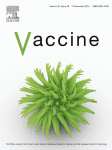Ver ítem
- xmlui.general.dspace_homeCentros e Institutos de InvestigaciónCICVyA. Centro de Investigación en Ciencias Veterinarias y AgronómicasInstituto de VirologíaArtículos científicosxmlui.ArtifactBrowser.ItemViewer.trail
- Inicio
- Centros e Institutos de Investigación
- CICVyA. Centro de Investigación en Ciencias Veterinarias y Agronómicas
- Instituto de Virología
- Artículos científicos
- Ver ítem
Influence of antibodies transferred by colostrum in the immune responses of calves to current foot-and-mouth disease vaccines
Resumen
Immunity to currently used oil-adjuvanted inactivated vaccines against foot-and-mouth disease virus (FMDV) has been studied in detail in adult animals; however, the influence of maternally derived antibodies transferred through colostrum (Mat-Abs) in the immune responses of vaccinated calves is less clear. Here, we report the anti-FMDV humoral responses elicited in calves with or without Mat-Abs that received one or two doses of the current tetravalent
[ver mas...]
Immunity to currently used oil-adjuvanted inactivated vaccines against foot-and-mouth disease virus (FMDV) has been studied in detail in adult animals; however, the influence of maternally derived antibodies transferred through colostrum (Mat-Abs) in the immune responses of vaccinated calves is less clear. Here, we report the anti-FMDV humoral responses elicited in calves with or without Mat-Abs that received one or two doses of the current tetravalent oil-adjuvanted commercial vaccine used in Argentina. Anti-FMDV (O1/Campos strain) antibodies (Abs) were evaluated by Liquid Phase Blocking ELISA (LPB-ELISA), virus neutralization test (VNT), isotype ELISA (IgG1, IgG2 and IgM) and avidity ELISA, to allow for the first time a more detailed description of the humoral responses elicited. Our results show that primary IgM responses to FMDV vaccination only became evident as Mat-Abs titers decreased. Likewise, prime and boost vaccination schedules, applied 35 days apart to groups of calves with high or low levels of Mat-Abs, showed that the levels of preexisting neutralizing Mat-Abs prevented the loss of total Abs measured by LPB-ELISA but negatively interfered with the induction of virus neutralizing responses. Altogether, these findings indicate that comprehensive serological characterization of immune responses generated after vaccination in calves may reveal important information on the actual effectiveness of vaccination strategies for young animals, particularly in endemic settings.
[Cerrar]

Fuente
Vaccine 32 (48) : 6576-6582. (November 2014)
Fecha
2014-11-12
ISSN
0264-410X
Formato
pdf
Tipo de documento
artículo
Palabras Claves
Derechos de acceso
Restringido
 Excepto donde se diga explicitamente, este item se publica bajo la siguiente descripción: Creative Commons Attribution-NonCommercial-ShareAlike 2.5 Unported (CC BY-NC-SA 2.5)
Excepto donde se diga explicitamente, este item se publica bajo la siguiente descripción: Creative Commons Attribution-NonCommercial-ShareAlike 2.5 Unported (CC BY-NC-SA 2.5)

